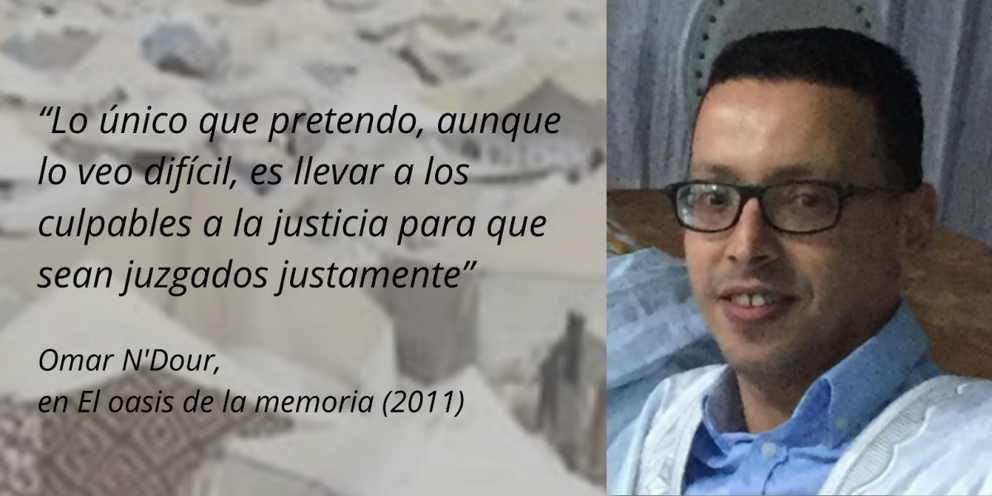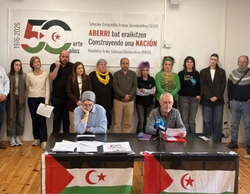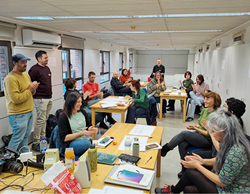
The UN Committee against Torture (CAT) recognises human rights violations perpetrated by Morocco against the Saharawi citizen Omar N'Dour
The UN Committee Against Torture (CAT) issued on 26 November a harsh resolution demanding that the State of Morocco carries out reparation and brings to justice those responsible for the torture and human rights violations suffered for several months by Saharawi citizen Omar N'Dour after he was arrested by Moroccan security forces in 2010. The CAT also urges Morocco to refrain from any form of pressure, intimidation or reprisal that could harm the physical and moral integrity of N'Dour and his family.
Omar N'Dour's story is documented in the book published by Hegoa “El oasis de la memoria. Memoria histórica y violaciones de Derechos Humanos en el Sáhara Occidental” (The Oasis of Memory: Historical Memory and Rights Violations in Western Sahara - Martin Beristain and González Hidalgo, 2012). In October 2010, young Saharawis set up the Gdeim Izik camp in the middle of the desert, ten kilometres from Laayoune, in occupied Western Sahara. This camp, the name of which means 'dignity' in Hassania, started out with a few tents as a peaceful protest against the social and economic conditions of the Moroccan occupation and, by the time of its violent dismantling in November 2010, had grown to accommodate some 16,000 people.
The attack and human rights violations
Omar N'Dour was part of the security team in this camp. When the Moroccan security forces attacked, Omar was not there, but he arrived at dawn and took several of the injured people to his house, where he was arrested with other colleagues and taken to a desert area outside the city. According to El oasis de la memoria:
"There, he was blindfolded and told that a pit had been dug for him, while he was threatened with death by stabbing and shooting. He was stripped of his clothes, bathed in cold water and raped with a glass bottle. When he returned to the police station, he was beaten, tortured and sent to a cell where he was kept with more than eighty other people. Later, he was brought from the prison before a judge, before whom Omar alleged that he had been subjected to torture, showing the injuries to the judge and demanding a forensic medical report.
Despite the fact that Omar N'Dour was injured, he was denied medical attention until several months later, while he was imprisoned in extremely overcrowded and unhygienic conditions. He was underfed. In May 2011, Omar was released.
"Bringing those guilty to justice".
Now, "after studying for five years the complaint together with the reports presented by Omar, as well as the successive allegations of the Moroccan state to the contrary", the CAT has validated the victim’s account of what happened after his arrest (Reviejo, 2021).
Thus, the CAT considers that the physical ill-treatment and injuries suffered by N'Dour during his arrest, interrogation and detention constitute torture as per Article 1 of the Convention against Torture. The CAT also accuses the Moroccan state of having violated the Convention by letting these crimes go unpunished and indicates several measures of reparation to be taken.
This resolution is an important step forward towards the recognition of the truth of the Saharawi victims of human rights violations by Morocco and reinforces their demand for justice. In this sense, Omar himself, when providing his testimony for El oasis de la memoria, recalled: "The only thing I want, although I consider this difficult, is to bring those guilty before justice so that they can be judged fairly".
MORE INFORMATION:
- “La ONU hace justicia con un saharaui torturado por fuerzas de seguridad de Marruecos cuya denuncia nadie investigó”. ("UN does justice to a Saharawi victim tortured by Moroccan security forces whose complaint nobody investigated") Santiago F. Reviejo. Público, 12/12/2021.
- “El Comité Contra la Tortura (CAT) de Naciones Unidas, en reciente decisión de 26 noviembre de 2021, reconoce las violaciones perpetradas por Marruecos al ciudadano saharaui Omar N’Dour, relacionado con los hechos de Gdeim Izik”. ("The UN Committee Against Torture (CAT), in a recent decision dated 26 November 2021, recognises the violations perpetrated by Morocco against Saharawi citizen Omar N'Dour, related to the events of Gdeim Izik") No te olvides del Sahara Occidental, 03/12/2021.
- “La verdad que se empeña”. ("The stubborn truth") Carlos Martín Beristain. La silla vacía, 03/12/2021.
Related news




